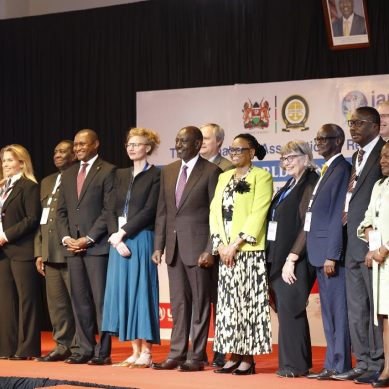
Last year, YouTube, which is owned by Google, announced that it would “stop removing content that advances false claims that widespread fraud, errors or glitches occurred in the 2020 and other past US presidential elections.”
Google spokesperson Elena Hernandez said, “There were no cuts to the Trust and Safety teams that work on elections. We continue to make significant investments in the people, policies and systems that enable Google and YouTube to be a reliable source for election-related news and information.” Hernandez did not respond to questions about whether the company would be updating its policies around election fraud claims in anticipation of the US presidential elections.
Recent reporting from The New York Times found that lies about the election have since spread widely on the platform. In previous years, a story like that might have put pressure on YouTube to enforce or change its policies, but now, conservative activist Christopher Rufo wrote on X, “in a post-Elon environment, YouTube’s response is: ‘The ability to openly debate political ideas, even those that are controversial, is an important value – especially in the midst of election season.’”
“I think the public antics of Musk are diverting attention away from other companies who continue to launch products or make policy changes that demand careful thinking and transparency,” says Sabhanaz Rashid Diya, founder of the Tech Global Institute, a think-tank focused on tech policy and a former Meta employee.
Earlier this year, Meta announced that it would no longer recommend political content to users on Threads and Instagram – although what exactly counts as politics remains unclear.
Last year, the company removed restrictions on ads claiming the 2020 election was stolen and on Covid-19 misinformation. In July it removed restrictions on Trump’s Facebook account, which has 35 million followers. In August, less than three months ahead of the elections, it also wound down the tool Crowdtangle, which allowed journalists and civil society to monitor content on Meta’s platforms. (After taking over X, Musk announced that he would charge $40,000 for access to the platform’s API).
While X under Musk has presented a whole host of new issues for advocates and civil society, less attention has been paid to other, established platforms having many of the same problems they’ve had for years. Reporting found that nearly four years after the January 6, 2021, insurrection at the Capitol, militia groups are still organizing on Facebook, with the platform even autogenerating pages for interested users.
Meta’s and TikTok’s systems still can’t reliably detect ads containing election disinformation. Amazon’s Alexa told users the 2020 election was stolen.
“We do not have visibility on whether ad models in the lead-up to major elections have been changed, or whether researchers have been able to meaningfully engage with platforms and user metrics to study key information trends,” says Diya. “We still have unresolved questions about basic product or policy features that warrant continued scrutiny and should not be sidelined amidst specific individuals or one company monopolizing airtime.”
“Musk doesn’t take responsibility for anything on his platform, so it makes it a lot easier for other platforms to do the same,” says Alexandra Pardal, CEO of Digital Action, a nonprofit advocacy group focused on human rights and technology. “He’s changed norms about what’s acceptable and not, about what a responsible social media platform looks like. Musk has successfully masked [these changes] by making this the Elon Show.”
In a recent interview with the Acquired podcast, Meta CEO Mark Zuckerberg said that he regretted allowing Meta to take responsibility for things that he saw as outside its mandate or control. “People are basically blaming social media and the tech industry for all these things in society – if we’re saying, we’re really gonna do our part to fix this stuff, I think there were a bunch of people who just took that and were like, oh, you’re taking responsibility for that? Let me, like, kick you for more stuff.” Bloomberg also noted a shift in Zuckerberg’s approach to the 2024 election—namely, to avoid saying much about it at all.
Musk is obviously not the only driving force for this change. Tech companies have come under increasing scrutiny from both sides of the aisle, particularly from the GOP. This has made it particularly painful—and risky – for them to take action on certain topics. For instance, last year, a federal judge issued an injunction preventing social media companies from talking to the government, saying that Biden officials “engaged in a broad pressure campaign designed to coerce social-media companies into suppressing speakers, viewpoints, and content disfavoured by the government.”
For companies like Meta, that meant that their threat detection teams were unable to alert or hear from federal agencies about issues. The Supreme Court ruled this summer that complainants lacked standing.
In August, Zuckerberg issued a letter to Jim Jordan’s congressional Subcommittee on the Weaponization of the Federal Government, saying that the company had, indeed bowed to government pressure to remove misinformation about Covid-19.
Three former Meta employees who spoke to Wired on the condition of anonymity say that they did not get the sense that government pressure was behind Meta’s choices to suppress or remove Covid-19 misinformation at the time.
Pardal says that if Musk was not behaving so outrageously, she doubts that Zuckerberg “would be saying he made a mistake.”
And Trump, it seems, approves. In an interview with the Barstool Sports podcast Bussin’ With the Boys, Trump said, “I actually believe [Zuckerberg’s] staying out of the election, which is nice.” The former president has also claimed that other tech executives, including Sundar Pichai, Jeff Bezos and Tim Cook, are supporters.
Bezos, who owns The Washington Post, prevented an editorial endorsing Vice President Kamala Harris from running, the same day that executives from his space company, Blue Origin, met with Trump, signalling a willingness on the part of the industry to cooperate with a possible second Trump administration. (Bezos appeared unmoved, even in the face of more than 200,000 people cancelling their subscriptions to the paper.)
But none of these nods toward Trump are as obvious as Musk’s support for the former president, and the use of X to seed mis- and disinformation about the election, says Pardal. “[Musk] has drawn attention away from other tech companies and onto himself, when it comes to tech harms,” says Pardal. “Now we are all talking about what Elon says next, and moving away from the discussion about the decline in platform safety at a time of exponentially rising risks.”
- A Tell / Wired report








